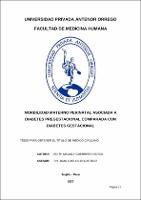Morbilidad materno perinatal asociada a diabetes pregestacional comparada con diabetes gestacional

View/Open
Download
(application/pdf: 722.1Kb)
(application/pdf: 722.1Kb)
Date
2020Author(s)
Guerrero Barco, Edith Magaly
Metadata
Show full item recordAbstract
Determinar si existe mayor Morbilidad Materno Perinatal en gestantes
con Diabetes Pregestacional comparada con Diabetes Gestacional en el Hospital
Regional de Trujillo de enero 2013 a diciembre 2017.
Material y métodos: Este estudio corresponde a un diseño de Cohorte
Retrospectivo, Se incluyó a 129 historias clínicas de pacientes con Diabetes
durante la gestación en el Hospital Regional Docente de Trujillo durante el
periodo de Enero del 2013 a Diciembre del 2017, provistas por el servicio de
archivo del hospital. Se utilizó una hoja de recolección de datos comprendiendo
trimestre, tipo de diabetes, glucosa en ayunas y glucosa a las 2h de carga oral,
morbilidad materna, morbilidad fetal, número de partos previos, nivel de glicemia,
número de controles y edad gestacional. Los datos obtenidos fueron trasladados
a una tabla de Microsoft Exel 2019 adaptado para el procesamiento estadístico
para su análisis.
Resultados: Las 129 pacientes se dividieron en 2 grupos: 43 pacientes con
Diabetes Pregestacional y 86 pacientes con Diabetes Gestacional. El 82% de las
pacientes tuvieron morbilidades Materno Perinatales. Dentro de las Morbilidades
Maternas para la Diabetes Pregestacional, polihidramnios fue la más frecuente
con 34.88%, seguida de hipertensión inducida por el embarazo (32.56%), y
corioamnionitis (16.28%); y para la Diabetes Gestacional la hipertensión inducida
por el embarazo fue la más frecuente con 23.26%, seguida de corioamnionitis
(16.28%), y polihidramnios (15.12%). Dentro de las Morbilidades Perinatales
para la Diabetes Pregestacional la macrosomía fue la más frecuente con 39.53%,
luego malformaciones congénitas (23.26%), e hipoglicemia (16.28%); y para la
Diabetes Gestacional la macrosomía fue la más frecuente con 27.91%, luego
hipoglicemia (20.93%), y malformaciones congénitas (3.49%).
Conclusiones: La Diabetes Pregestacional está asociado a mayor Morbilidad
Materno Perinatal que Diabetes Gestacional (RR: 1.26, IC: 95%, p<0,05). To determine if there is greater Maternal Perinatal Morbidity in
pregnant women with Pregestational Diabetes compared to Gestational Diabetes
in the Regional Hospital of Trujillo from January 2013 to December 2017.
Material and methods: This study corresponds to a Retrospective Cohort
design. 129 clinical histories of patients with Diabetes were included during
pregnancy at the Trujillo Regional Teaching Hospital during the period from
January 2013 to December 2017, provided by the service of hospital file. A data
collection sheet was used, including trimester, type of diabetes, fasting glucose
and glucose at 2 hours of oral load, maternal morbidity, fetal morbidity, number
of previous deliveries, blood glucose level, number of controls and gestational
age. The data obtained were transferred to a Microsoft Exel 2019 table adapted
for statistical processing for analysis.
Results: The 129 patients were divided into 2 groups: 43 patients with
Pregestational Diabetes and 86 patients with Gestational Diabetes. 82% of the
patients had Maternal Perinatal morbidities. Among the Maternal Morbidities for
Pregestational Diabetes, polyhydramnios was the most frequent with 34.88%,
followed by pregnancy-induced hypertension (32.56%), and chorioamnionitis
(16.28%); and for Gestational Diabetes, pregnancy-induced hypertension was
the most frequent with 23.26%, followed by chorioamnionitis (16.28%), and
polyhydramnios (15.12%). Within the Perinatal Morbidities for Pregestational
Diabetes, macrosomia was the most frequent with 39.53%, then congenital
malformations (23.26%), and hypoglycemia (16.28%); and for Gestational
Diabetes, macrosomia was the most frequent with 27.91%, then hypoglycemia
(20.93%), and congenital malformations (3.49%).
Conclusions: Pregestational Diabetes is associated with greater Maternal
Perinatal Morbidity than Gestational Diabetes (RR: 1.26, CI: 95%, p <0.05).
Subject
Collections
- Medicina Humana [3196]

